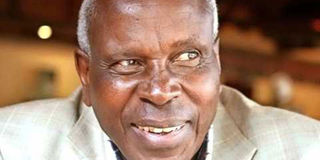Court battle for reclusive tycoon’s wealth opens lid on his vast empire

John Mwangi Kagema was one of the wealthiest Kenyans with interests in various sectors. PHOTO | FILE | NMG
What you need to know:
The founding chief executive of Equity Building Society — the precursor of Equity Bank — was mostly known as the owner of the luxurious Enashipai Resort and Spa in Naivasha.
But now, because of a disputed succession process in court, the lid has been blown open on the empire he left behind — and so are his family relations.
The battle for a share of reclusive billionaire John Mwangi Kagema’s wealth has moved to court after a woman claiming she was his wife alleged there were plans to sideline her and her children.
Being the introvert that he was, Mr Kagema died in December last year unknown to many that he was one of the wealthiest Kenyans with interests in various sectors — including banking and hospitality — running into billions of shillings.
BIRTH CERTIFICATES
The founding chief executive of Equity Building Society — the precursor of Equity Bank — was mostly known as the owner of the luxurious Enashipai Resort and Spa in Naivasha.
But now, because of a disputed succession process in court, the lid has been blown open on the empire he left behind — and so are his family relations.
In February, his widow Beatrice Wanjiku alongside James Kagema and Daniel Wamahihu — who are among her four children — filed a succession case at the High Court in Nairobi to kick-start the process of being administrators of the estate.
Days later, an objection to that succession cause was filed. It came from Serah Wanjiru Ngugi, who says she was also married to Mr Kagema but was “deliberately” left out of those proceedings.
Ms Wanjiru argues in court papers that she married Mr Kagema under Kikuyu customary laws — a marriage that was instituted by a ceremony in Kabete, Kiambu County, in January 2007.
To buttress her marriage claim, she had attached an affidavit Mr Kagema swore to that effect in April 2018, eight months before he died aged 73 due to what was termed in death announcements as “a long fight with ill-health”.
Ms Wanjiru says her marriage was blessed with twins — a boy and a girl born on Valentine’s Day 2008. She has provided birth certificates in her court filings in which Mr Kagema is listed as the father.
Despite this, Ms Wanjiru argues that she was omitted from the succession proceedings.
“The petitioners who personally know me have dishonestly, deliberately and defiantly purported to exclude me and the deceased’s children as beneficiaries of the deceased’s estate,” she states in her affidavit filed 20 days after the initial case was lodged.
MAIN ADMINSTRATOR
Ms Wanjiru not only criticises her omission but also what she terms an understating of the assets Mr Kagema left behind and an overstating of the liabilities he had.
“The petitioners have deceitfully and mischievously declared a fraction of the deceased’s assets which is an act of bad faith since the deceased’s assets run into tens of billions,” she states.
She goes ahead to list numerous properties owned by Mr Kagema that the applicants did not mention.
They include shares he owned in 21 companies, an insurance policy, at least 118 plots of land across the country, a mining company, and at least 19 motor vehicles.
The reason she is so sure about those properties, she says, is because she lived with him in Nairobi’s Westlands for over 12 years. As a matter of fact, she argues, she is the one who deserves to be the main administrator.
“As the wife of the deceased who lived with him, I am the most suitable person to administer the estate, taking into account the bad faith of the petitioners,” she argues.
Ms Wanjiru’s application has vehemently been challenged.
Lawyer Judy Thongori, who is representing the parties that first filed the application, says Ms Wanjiru’s request is premature as a gazette notice has to be issued first.
In a letter to the court’s deputy registrar, sent even before Ms Wanjiru filed her objection, Ms Thongori stated that should there be any objectors, they should await a notice in the Kenya Gazette, which ordinarily gives 60 days for anyone objecting to issuance of a grant.
PROPERTY DIMINISHED
“We have obtained information from the court registry that an intending objector Serah Wanjiru Ngugi has, through her advocates, sought to halt the publishing of the cause in the gazette ostensibly because she intends to file her answer and cross application for grant,” wrote the lawyer.
But in Ms Wanjiru’s view, the process should not reach gazetting if Mr Kagema’s property is understated.
“I hereby object to the issuance of any grant or any gazettement to enable filing, hearing and determination of a suitable application to address issues of discovery, documentation and accounting of the deceased’s estate with a view to determine urgent provisions of myself and my children,” she states.
The manner in which Mr Kagema’s property has been diminished, she argues, demeans him.
“For the interest of justice, the true value of the estate is material and should be truly disclosed to court so as to determine real issues,” adds Ms Wanjiru.
In her argument on the overstating of the liabilities against Mr Kagema, Ms Wanjiru mentions a case of Johenson Kenya Limited, where Mr Kagema owned 900 of the available 500,000 shares.
Whereas the petitioners stated that the liability stood at Sh1.5 billion, she says Mr Kagema’s total liability is just Sh2.7 million because he has a paltry 0.18 per cent share.





